英语课标人与自然
人与自然和谐英语
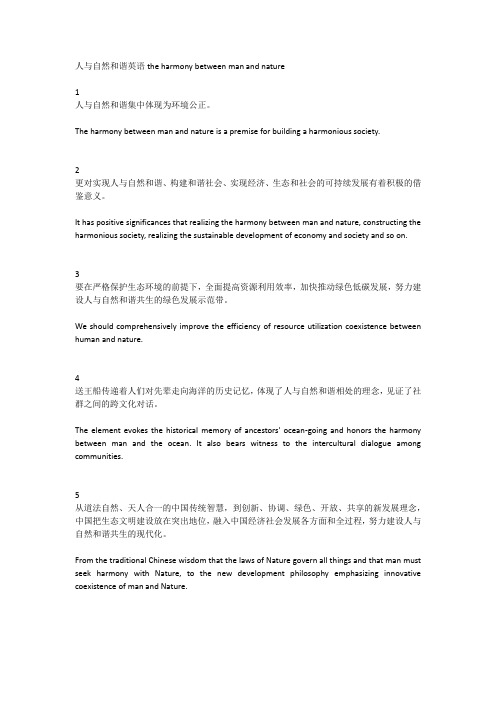
人与自然和谐英语the harmony between man and nature1人与自然和谐集中体现为环境公正。
The harmony between man and nature is a premise for building a harmonious society.2更对实现人与自然和谐、构建和谐社会、实现经济、生态和社会的可持续发展有着积极的借鉴意义。
It has positive significances that realizing the harmony between man and nature, constructing the harmonious society, realizing the sustainable development of economy and society and so on.3要在严格保护生态环境的前提下,全面提高资源利用效率,加快推动绿色低碳发展,努力建设人与自然和谐共生的绿色发展示范带。
We should comprehensively improve the efficiency of resource utilization coexistence between human and nature.4送王船传递着人们对先辈走向海洋的历史记忆,体现了人与自然和谐相处的理念,见证了社群之间的跨文化对话。
The element evokes the historical memory of ancestors' ocean-going and honors the harmony between man and the ocean. It also bears witness to the intercultural dialogue among communities.5从道法自然、天人合一的中国传统智慧,到创新、协调、绿色、开放、共享的新发展理念,中国把生态文明建设放在突出地位,融入中国经济社会发展各方面和全过程,努力建设人与自然和谐共生的现代化。
新课标下人教版高中英语必修教材主题语境分析

2372020年12期总第504期ENGLISH ON CAMPUS 新课标下人教版高中英语必修教材主题语境分析文/周建冰 胡思邦具备较强的阅读能力和逻辑思维能力,文章术语较多,趣味性不强。
即使教材中“人与自然”板块已经尽力与生活联系在一起,如B1U4中的唐山大地震,或是B5U5中的“烧伤急救”,但也难逃被冷落的事实。
“人与自我”主题语境在五本教材中存在感最低,“安妮日记”关注人的内心,“来吃饭呀”关于健康饮食,“难忘的第一个工作任务”属于做人与做事。
笔者看来,人教版中“人与自我”主题对高中生来说较为简单,对学生阅读水平、思维水平的提高帮助较小。
“安妮日记”放在第一册书的第一个单元,文章容易程度清晰可见;“来吃饭呀”这类健康饮食方面更适合初中生,文章思考性不强;“难忘的第一个工作任务”思维、语言水平有所上升,因此被放在第五本必修教材中。
“人与自我”主题,文章深度太高的话,高中生阅读起来较为吃力;但水平较低的话,学生又很难从阅读这类文章中取得进步。
选材较难,但为了丰富主题语境,而有所涉猎“人与自我”在人教版必修教材中处于边缘位置也就不足为奇了。
三、结论与启示“主题语境不仅规约着语言知识和文化知识的学习氛围,还为语言学习提供意义语境。
”人教版必修教材选题广泛,却又重点突出“人与社会”主题,有利于为学习者提供良好的学习资源。
并且,主题语境广度与深度呈现上总体呈递进趋势,符合学习者的学习规律。
但是,因为这套教材已使用十余年,随着社会发展和中国英语学习的进步,其中有许多地方已经不合时宜。
某些主题语境较为陈旧,如“唐山大地震”;有些语境过于简单,如“来吃饭呀”。
加之主题语境种关于中国文化部分较少,不利于培养学生的中西文化比较思维。
在当今社会,科学技术快速发展,“英语热”依旧席卷全球,学生的英语水平越来越高,高中英语教材主题语境也应当与时俱进。
以此“推动学生对主题的深度学习,帮助他们建构新概念,体验不同的生活,丰富人生阅历和思维方式,树立正确的世界观、人生观和价值观,实现知行统一”。
浅谈初中英语“人与自然”主题范畴下的阅读教学——以译林版初中英语八年级上册Unit_8的Readin

观,实现知行合一[2]。因此,教师可以从建构新知
[基金项目]本文系无锡市教育科学“十三五”规划课题“基于深度学习的初中英语阅读教学研究”
(课题编号:F/E/
2018/004)的阶段性研究成果。
中学教学参考
2023·
2023
·6
38
Copyright©博看网. All Rights Reserved.
the ground,screamed in fear...
ran out of the building,ran in all directions,
fall down,dark and silent...
felt a slight shake,felt nervous,beat hard...
fear went through my mind...
(二)挖掘主题内涵
挖掘主题内涵,
,形成正确的观念
新课标指出,英语课程应以德育为魂、能力为
重、基础为先、创新为上,注重在发展学生英语语言
运用能力的过程中,帮助他们学习、理解和鉴赏中
外优秀文化,厚植家国情怀,坚定文化自信,开阔国
际视野,深化国际理解,逐步提升跨文化沟通能力、
思辨能力、学习能力和创新能力,形成正确的世界
keep shouting for help in order to save energy...
Task 3:Teacher asks Students to read out what
Teacher encourages Students to feel what Timmy
角度感受地震的威力及其对人们的伤害。
action will you take?
Timmy saw and heard and how Timmy felt. And
初中英语课程标准-课程内容的解读

(3)语言知识(发展语言技能的重要基础):
包括语音、词汇、语法、语篇和语用知识。
※三级语法知识内容要求:
级别
内容要求
三级
1.初步意识到语言中使用的语法知识是“形式—意义—使用”的统 一体,明确学习语法的目的是在语境中运用语法知识理解和表 达意义; 2.了解句子的结构特征,如句子的种类、成分、语序和主谓一致; 3.在口语和书面语篇中理解、体会所学语法的形式和表意功能; 4.在语境中运用所学语法知识进行描述、叙述和说明等。
(3)语言知识(发展语言技能的重要基础):
包括语音、词汇、语法、语篇和语用知识。
※三级词汇知识内容要求:
级别
三级
内容要求
1.了解词汇包括单词、短语、习惯用语和固定搭配形式; 2.理解和领悟词汇的基本含义,以及在特定语境和语篇中的 意义、词性和功能; 3.识别词根、词缀理解生词,辨识单词中的前缀后缀的意义; 4.在特定语境中,根据不同的主题,运用词汇给事物命名, 描述事物、行为和特征表达主要信息和观点; 5.围绕相关主题学习并使用约1600个单词进行交流和表达, 根据实际情况接触并学习相关主题范围内100-300个单词, 以及一定数量的习惯用语或者固定搭配。
03.义务教育英语课程分为三级: 预备级和三个级别+,级别+为学有余力的学生提供选择
预备级
一级/一级+
二级/二级+
三级/三级+
1-2年级 视听说为主
3-4年级
5-6年级
7-9年级
以一级二级为基础,主要了解三级要求。
二.英语课程的内容要求:
课程内容六个要素的学习范围和学习要求按照三个基本级别进行描述:
(3)语言知识(发展语言技能的重要基础):
初中英语译林版单元主题分类 人与自我 人与社会 人与自然

初中英语译林版单元主题分类人与自我人与社会人与自然The Journey of Self-Discovery: Navigating the Realms of Self, Society, and NatureAdolescence is a transformative period in one's life, a time of self-exploration and growth. As individuals navigate the complexities of this stage, they often find themselves grappling with the intricate relationships between the self, society, and the natural world. The English textbook series, Yingjie, provides a comprehensive framework for understanding these interconnected themes, guiding students through the nuances of personal development, social dynamics, and environmental awareness.The first thematic unit, "Person and Self," delves into the introspective journey of self-discovery. This module encourages students to examine their own identity, values, and aspirations, empowering them to cultivate a strong sense of self-awareness. Through engaging activities and thought-provoking discussions,learners are invited to reflect on their personal strengths, challenges, and the factors that shape their unique personalities. By exploring themes such as self-esteem, emotional intelligence, and personal goal-setting, students gain the tools to navigate the complexities of their inner world and develop a deeper understanding of themselves.As individuals navigate the path of self-discovery, they inevitably encounter the realm of "Person and Society," the second thematic unit in the Yingjie series. This module explores the dynamic interplay between the individual and the broader social landscape. Students delve into the nature of interpersonal relationships, examining the roles of communication, empathy, and conflict resolution in fostering healthy connections with family, friends, and peers. They also engage with topics related to social responsibilities, civic engagement, and the importance of ethical decision-making, equipping them with the skills to navigate the intricate web of social interactions.The final thematic unit, "Person and Nature," invites students to explore the intricate relationship between humanity and the natural world. This module encourages learners to develop a deeper appreciation for the environment, recognizing the delicate balance that sustains all life on Earth. Through activities and discussions, students examine environmental issues, such as climate change, resource conservation, and biodiversity preservation. They are challenged to consider their own ecological footprint and exploreways in which they can contribute to sustainable practices, fostering a sense of environmental stewardship and a commitment to safeguarding the natural world.Throughout the Yingjie series, these three interconnected themes –"Person and Self," "Person and Society," and "Person and Nature" –provide a comprehensive framework for student development. By exploring the complex relationships between the individual, the social sphere, and the natural environment, learners are empowered to cultivate a holistic understanding of their place in the world and their role in shaping a better future.The "Person and Self" unit encourages introspection, self-reflection, and the cultivation of a strong sense of identity, equipping students with the tools to navigate the challenges of adolescence and beyond. The "Person and Society" module fosters interpersonal skills, social awareness, and a sense of civic responsibility, preparing learners to engage with the world around them in a meaningful and constructive manner. The "Person and Nature" unit instills a deep appreciation for the natural world, inspiring students to become responsible stewards of the environment and to consider the long-term implications of their actions.As students progress through the Yingjie series, they embark on a transformative journey of self-discovery, social engagement, andenvironmental consciousness. This holistic approach to education empowers learners to develop a multifaceted understanding of themselves, their relationships, and their role in shaping a sustainable future. By seamlessly integrating these three interconnected themes, the Yingjie textbooks provide a robust and comprehensive framework for nurturing well-rounded individuals who are equipped to navigate the complexities of the modern world.。
《普通高中英语课程标准》(2017年版)重点内容双语解读
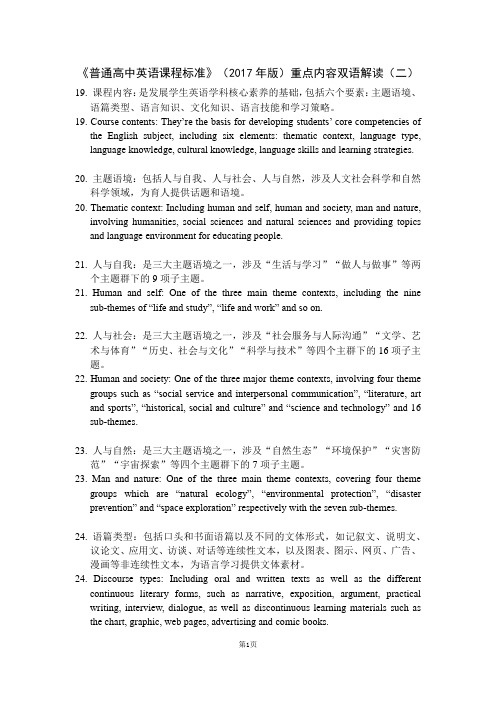
《普通高中英语课程标准》(2017年版)重点内容双语解读(二)19. 课程内容:是发展学生英语学科核心素养的基础,包括六个要素:主题语境、语篇类型、语言知识、文化知识、语言技能和学习策略。
19. Course contents: They’re the basis for developing students’ core competencies ofthe English subject, including six elements: thematic context, language type, language knowledge, cultural knowledge, language skills and learning strategies.20. 主题语境:包括人与自我、人与社会、人与自然,涉及人文社会科学和自然科学领域,为育人提供话题和语境。
20. Thematic context: Including human and self, human and society, man and nature,involving humanities, social sciences and natural sciences and providing topics and language environment for educating people.21. 人与自我:是三大主题语境之一,涉及“生活与学习”“做人与做事”等两个主题群下的9项子主题。
21. Human and self: One of the three main theme contexts, including the ninesub-themes of “life and study”, “life and work” and so on.22. 人与社会:是三大主题语境之一,涉及“社会服务与人际沟通”“文学、艺术与体育”“历史、社会与文化”“科学与技术”等四个主群下的16项子主题。
“人与自然”主题在英语学科中的教育意涵与教学建构
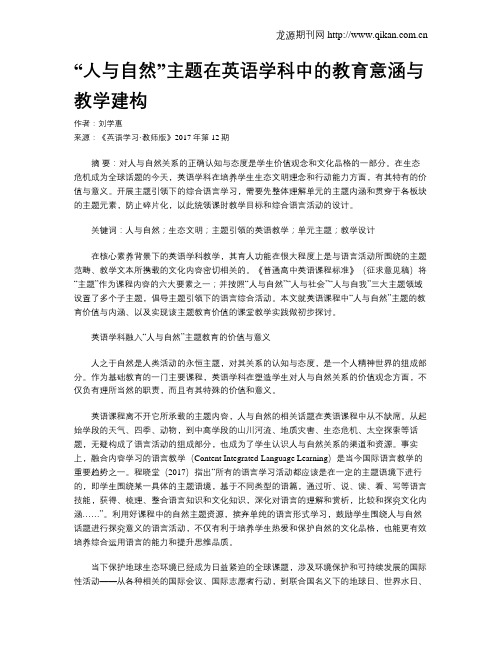
“人与自然”主题在英语学科中的教育意涵与教学建构作者:刘学惠来源:《英语学习·教师版》2017年第12期摘要:对人与自然关系的正确认知与态度是学生价值观念和文化品格的一部分。
在生态危机成为全球话题的今天,英语学科在培养学生生态文明理念和行动能力方面,有其特有的价值与意义。
开展主题引领下的综合语言学习,需要先整体理解单元的主题内涵和贯穿于各板块的主题元素,防止碎片化,以此统领课时教学目标和综合语言活动的设计。
关键词:人与自然;生态文明;主题引领的英语教学;单元主题;教学设计在核心素养背景下的英语学科教学,其育人功能在很大程度上是与语言活动所围绕的主题范畴、教学文本所携载的文化内容密切相关的。
《普通高中英语课程标准》(征求意见稿)将“主题”作为课程内容的六大要素之一;并按照“人与自然”“人与社会”“人与自我”三大主题领域设置了多个子主题,倡导主题引领下的语言综合活动。
本文就英语课程中“人与自然”主题的教育价值与内涵、以及实现该主题教育价值的课堂教学实践做初步探讨。
英语学科融入“人与自然”主题教育的价值与意义人之于自然是人类活动的永恒主题,对其关系的认知与态度,是一个人精神世界的组成部分。
作为基础教育的一门主要课程,英语学科在塑造学生对人与自然关系的价值观念方面,不仅负有理所当然的职责,而且有其特殊的价值和意义。
英语课程离不开它所承载的主题内容,人与自然的相关话题在英语课程中从不缺席。
从起始学段的天气、四季、动物,到中高学段的山川河流、地质灾害、生态危机、太空探索等话题,无疑构成了语言活动的组成部分,也成为了学生认识人与自然关系的渠道和资源。
事实上,融合内容学习的语言教学(Content Integrated Language Learning)是当今国际语言教学的重要趋势之一。
程晓堂(2017)指出“所有的语言学习活动都应该是在一定的主题语境下进行的,即学生围绕某一具体的主题语境,基于不同类型的语篇,通过听、说、读、看、写等语言技能,获得、梳理、整合语言知识和文化知识,深化对语言的理解和赏析,比较和探究文化内涵……”。
初中英语新课程标准人与自然

初中英语新课程标准人与自然As an AI language model trained by OpenAI, I will do my best to provide a comprehensive response to your request.The new curriculum standard for middle school English education in the "People and Nature" section requires the following:1. Respond in both English and Chinese, with the English response coming first, followed by the Chinese response. The English response must be completed before the Chinese response is provided. No emoticons or other special characters should be used.2. The total word count should not be less than 1200 words, and the prompt should not be revealed in the response.In English:The new curriculum standard for middle school English education in the "People and Nature" section emphasizes the importance of understanding the relationship between humans and the natural environment. This includes exploring the various ways in which humans interact with and rely on thenatural world, as well as the impact that human activities can have on the environment.One key aspect of this standard is the ability to describe the role of natural resources in supporting human life and activities. Students should be able to identify and explain the different types of natural resources, such as renewable and non-renewable resources, and how they are used to meet our basic needs for food, water, energy, and shelter. They should also be able to discuss the importance of sustainable resource management and the potential consequences of resource depletion or misuse.Another important focus of this standard is the study of environmental issues and their impact on human well-being. Students should be able to recognize and analyze various environmental problems, such as pollution, climate change, and habitat destruction, and understand the ways in which these issues can affect human health, livelihoods, and quality of life. They should also be able to explore potential solutions and strategies for addressing these challenges, including the role of individual and collective action.In addition to these content-focused objectives, the new curriculum standard also emphasizes the development of critical thinking and communication skills. Students should be able to engage in informed discussions and debates about environmental issues, using evidence-based reasoning to support their arguments and perspectives. They should also be able to effectively communicate their ideas and findings through a variety of written and oral formats, such as essays, presentations, and multimedia projects.Overall, the "People and Nature" section of the new middle school English curriculum standard represents a comprehensive and holistic approach to environmental education, equipping students with the knowledge, skills, and dispositions necessary to navigate the complex relationship between humans and the natural world.中文:新的初中英语课程标准中"人与自然"部分强调了理解人类与自然环境之间关系的重要性。
义务教育英语课程标准主题分类
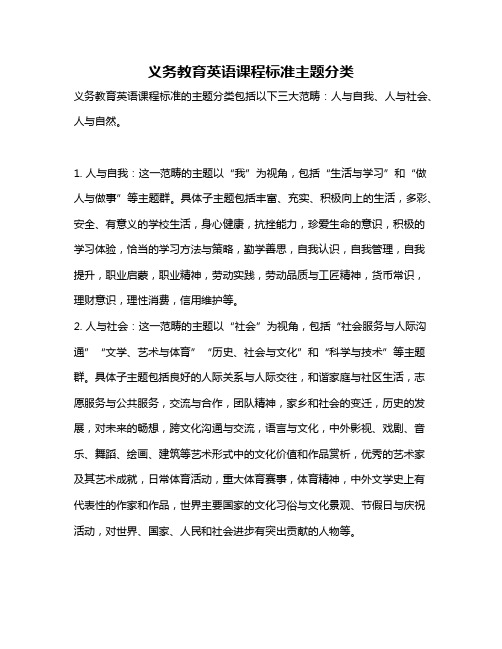
义务教育英语课程标准主题分类
义务教育英语课程标准的主题分类包括以下三大范畴:人与自我、人与社会、人与自然。
1. 人与自我:这一范畴的主题以“我”为视角,包括“生活与学习”和“做人与做事”等主题群。
具体子主题包括丰富、充实、积极向上的生活,多彩、安全、有意义的学校生活,身心健康,抗挫能力,珍爱生命的意识,积极的学习体验,恰当的学习方法与策略,勤学善思,自我认识,自我管理,自我提升,职业启蒙,职业精神,劳动实践,劳动品质与工匠精神,货币常识,理财意识,理性消费,信用维护等。
2. 人与社会:这一范畴的主题以“社会”为视角,包括“社会服务与人际沟通”“文学、艺术与体育”“历史、社会与文化”和“科学与技术”等主题群。
具体子主题包括良好的人际关系与人际交往,和谐家庭与社区生活,志愿服务与公共服务,交流与合作,团队精神,家乡和社会的变迁,历史的发展,对未来的畅想,跨文化沟通与交流,语言与文化,中外影视、戏剧、音乐、舞蹈、绘画、建筑等艺术形式中的文化价值和作品赏析,优秀的艺术家及其艺术成就,日常体育活动,重大体育赛事,体育精神,中外文学史上有代表性的作家和作品,世界主要国家的文化习俗与文化景观、节假日与庆祝活动,对世界、国家、人民和社会进步有突出贡献的人物等。
3. 人与自然:这一范畴的主题以“自然”为视角,包括“自然生态”“环境保护”“灾害防范”和“宇宙探索”等主题群。
以上内容仅供参考,建议查阅《义务教育英语课程标准》了解更多信息。
英语新课标三大主题语境

英语新课标三大主题语境(最新版)目录1.英语新课标的三大主题语境2.主题语境一:人与自然3.主题语境二:人与社会4.主题语境三:人与自我正文【英语新课标的三大主题语境】随着社会的发展和国际化的进程,英语作为全球通用语言的地位日益重要。
我国教育部门针对这一现状,制定了新的英语课程标准,旨在提高国民的英语应用能力。
在新的英语课程标准中,三大主题语境成为了教学的核心内容,它们分别是:人与自然、人与社会、人与自我。
【主题语境一:人与自然】人与自然这个主题语境主要涉及学生对自然现象、环境保护等方面的认知。
通过学习这个主题语境,学生可以掌握描述自然现象的词汇和表达,提高在自然环境中使用英语进行沟通的能力。
此外,这个主题语境还有助于培养学生热爱自然、保护环境的意识。
【主题语境二:人与社会】人与社会这个主题语境主要涉及学生对社会现象、文化差异等方面的认知。
通过学习这个主题语境,学生可以了解不同国家和地区的风俗习惯,掌握描述社会现象的词汇和表达,提高在社会环境中使用英语进行沟通的能力。
此外,这个主题语境还有助于培养学生尊重多元文化、积极参与社会活动的意识。
【主题语境三:人与自我】人与自我这个主题语境主要涉及学生对自身情感、价值观等方面的认知。
通过学习这个主题语境,学生可以了解自己的情感、需求和价值观,掌握描述自身状况的词汇和表达,提高在自我认知和心理调适方面使用英语进行沟通的能力。
此外,这个主题语境还有助于培养学生自尊、自信、自强的品格,形成健康的人生观。
总之,英语新课标下的三大主题语境,即人与自然、人与社会、人与自我,旨在培养学生全面、均衡的英语应用能力。
2022义务教育英语课程标准解读
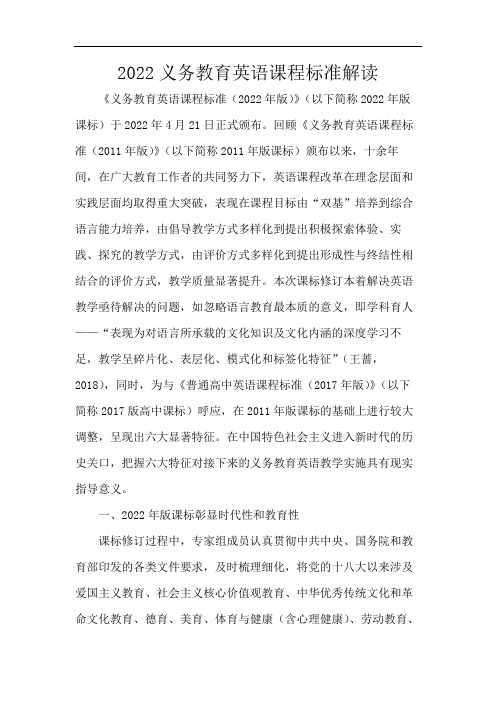
2022义务教育英语课程标准解读《义务教育英语课程标准(2022年版)》(以下简称2022年版课标)于2022年4月21日正式颁布。
回顾《义务教育英语课程标准(2011年版)》(以下简称2011年版课标)颁布以来,十余年间,在广大教育工作者的共同努力下,英语课程改革在理念层面和实践层面均取得重大突破,表现在课程目标由“双基”培养到综合语言能力培养,由倡导教学方式多样化到提出积极探索体验、实践、探究的教学方式,由评价方式多样化到提出形成性与终结性相结合的评价方式,教学质量显著提升。
本次课标修订本着解决英语教学亟待解决的问题,如忽略语言教育最本质的意义,即学科育人——“表现为对语言所承载的文化知识及文化内涵的深度学习不足,教学呈碎片化、表层化、模式化和标签化特征”(王蔷,2018),同时,为与《普通高中英语课程标准(2017年版)》(以下简称2017版高中课标)呼应,在2011年版课标的基础上进行较大调整,呈现出六大显著特征。
在中国特色社会主义进入新时代的历史关口,把握六大特征对接下来的义务教育英语教学实施具有现实指导意义。
一、2022年版课标彰显时代性和教育性课标修订过程中,专家组成员认真贯彻中共中央、国务院和教育部印发的各类文件要求,及时梳理细化,将党的十八大以来涉及爱国主义教育、社会主义核心价值观教育、中华优秀传统文化和革命文化教育、德育、美育、体育与健康(含心理健康)、劳动教育、法治教育、综合实践活动、生态文明教育、诚信教育等内容的文件精神和要求有机融入2022年版课标中,体现出鲜明的时代性和教育性。
1.时代性2022年版课标在课程性质中提到英语这门语言的价值,首次用了这样的表述:“……是国际交流与合作的重要沟通工具,也是传播人类文明成果的载体之一,对中国走向世界、世界了解中国、构建人类命运共同体具有重要作用。
”其中,学习和使用英语不再仅仅是为了“吸取人类文明成果、借鉴外国先进科学技术”。
2022年版课标将英语作为传播人类文明成果的载体之一,强调英语对中国走向世界和世界了解中国,构建人类命运共同体的作用,也就是说,使用英语的目的不仅在于“汲取”,还有“传播”,突出了英语在促进中外双向了解中的作用。
人与自然英语新课标
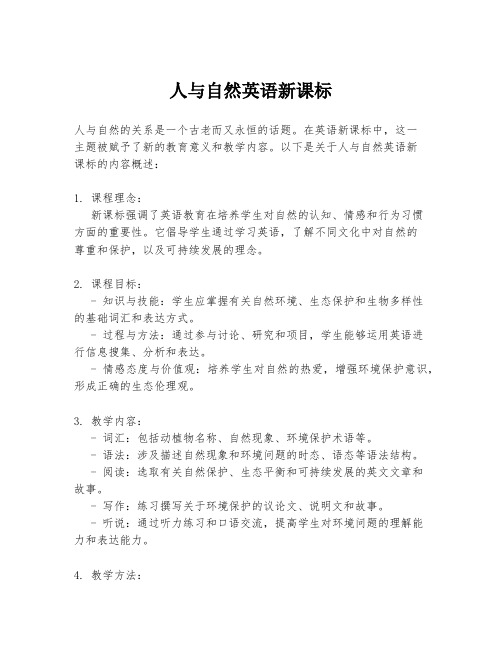
人与自然英语新课标人与自然的关系是一个古老而又永恒的话题。
在英语新课标中,这一主题被赋予了新的教育意义和教学内容。
以下是关于人与自然英语新课标的内容概述:1. 课程理念:新课标强调了英语教育在培养学生对自然的认知、情感和行为习惯方面的重要性。
它倡导学生通过学习英语,了解不同文化中对自然的尊重和保护,以及可持续发展的理念。
2. 课程目标:- 知识与技能:学生应掌握有关自然环境、生态保护和生物多样性的基础词汇和表达方式。
- 过程与方法:通过参与讨论、研究和项目,学生能够运用英语进行信息搜集、分析和表达。
- 情感态度与价值观:培养学生对自然的热爱,增强环境保护意识,形成正确的生态伦理观。
3. 教学内容:- 词汇:包括动植物名称、自然现象、环境保护术语等。
- 语法:涉及描述自然现象和环境问题的时态、语态等语法结构。
- 阅读:选取有关自然保护、生态平衡和可持续发展的英文文章和故事。
- 写作:练习撰写关于环境保护的议论文、说明文和故事。
- 听说:通过听力练习和口语交流,提高学生对环境问题的理解能力和表达能力。
4. 教学方法:- 情景教学:创设与自然相关的教学情景,激发学生的学习兴趣。
- 任务型学习:设计以环境保护为主题的项目,让学生在完成任务的过程中学习和使用英语。
- 合作学习:鼓励学生小组合作,共同探讨和解决环境问题。
5. 评价方式:- 形成性评价:通过课堂参与、小组讨论和项目展示等方式,持续跟踪学生的学习进展。
- 终结性评价:通过笔试和口试,综合评价学生的语言运用能力和对环境问题的理解。
6. 课程资源:- 利用多媒体和互联网资源,提供丰富的学习材料,如纪录片、新闻报道和在线课程。
- 鼓励学生参与社区和学校的环保活动,将课堂学习与社会实践相结合。
7. 跨学科整合:- 英语教学与地理、生物、化学等学科相结合,形成跨学科的综合课程,帮助学生全面理解人与自然的关系。
8. 社会责任:- 教育学生认识到作为地球公民的责任,鼓励他们参与到环境保护的行动中,成为可持续发展的推动者。
人与自然和谐相处英语作文课设计

人与自然和谐相处英语作文课设计全文共10篇示例,供读者参考篇1Hi everyone! Today, I'm going to talk about how people and nature can live together harmoniously. It's super important to take care of our environment so that we can all live happy and healthy lives.Firstly, we should always try to reduce, reuse, and recycle. This means using less plastic, composting our food scraps, and using things like reusable water bottles instead of plastic ones. By doing this, we can help keep our planet clean and beautiful.Secondly, we should be kind to animals and plants. We should never litter or harm them in any way. Instead, we should admire and appreciate all the wonderful creatures and plants that live on our planet.Thirdly, we should try to be more eco-friendly in our everyday lives. This could mean walking or biking instead of driving, turning off lights when we're not using them, and planting trees to help clean our air.By working together with nature, we can create a world where humans, animals, and plants can all live in harmony. Let's all do our part to protect and preserve our beautiful planet!篇2Okay, let's try to make a fun and engaging English essay on the topic of "Living in Harmony with Nature" from a primary school student's perspective!Title: Living in Harmony with NatureHey guys! Today, we're gonna talk about how cool it is to live in harmony with nature. Nature is so amazing, right? We can see beautiful flowers, trees, birds, and animals all around us. But guess what? We need to take care of nature too!First of all, we shouldn't litter. Yeah, I know it's tempting to throw trash on the ground when we're done with it, but that's a big no-no! We should always use the trash cans and recycle our trash. That way, we can keep our environment clean and healthy.Another thing we can do is to save water and electricity. When we brush our teeth or take a shower, we should turn off the tap when we're not using it. And hey, let's not forget to turnoff the lights when we leave a room! By saving water and electricity, we can help protect our planet.Oh, and we can also plant trees and flowers. It's super fun to watch them grow and bloom! Trees give us fresh air to breathe, and flowers make our surroundings colorful. Plus, they provide homes for birds and animals. How cool is that?Lastly, we should respect nature and all living things. We shouldn't harm animals or destroy their habitats. Instead, let's appreciate and protect them. Nature is our friend, so let's treat it with kindness and care.In conclusion, living in harmony with nature is important for us and the planet. Let's do our part to keep our environment clean, save resources, plant trees and flowers, and respect all living things. Together, we can make a difference and create a better world for ourselves and future generations.So, what do you guys think? Living in harmony with nature is pretty awesome, right? Let's all work together to protect and preserve our beautiful planet. It's our home, and we should take care of it!篇3Hello everyone! Today I'm going to talk about how people and nature can live together peacefully. It's super important to take care of our planet so that we can enjoy everything it has to offer.First, we should respect nature by not littering. It's bad for the environment and can hurt animals. We should also recycle and use less plastic to help keep our planet clean.Second, we should appreciate all the plants and animals around us. They are part of nature too and we should treat them with kindness. We can learn so much from them and they make the world a beautiful place to live in.Third, we should try to spend more time outside enjoying nature. We can go for walks in the park, hike in the mountains, or swim in the ocean. It's good for our health and it helps us connect with the world around us.Finally, we should learn about how we can help protect the environment. We can plant trees, clean up trash, and support organizations that care for nature. It's up to all of us to make sure that our planet stays healthy for future generations.So let's all do our part to live in harmony with nature and make the world a better place for everyone. Thank you for listening!篇4Title: Living in Harmony with NatureHey everyone, today I want to talk about how we can live in harmony with nature. Nature is so amazing and beautiful, and we should take care of it so it can stay that way. Here are some tips on how we can do that:1. Reduce, reuse, recycle: We should try to reduce the amount of trash we produce, reuse things as much as we can, and recycle whenever possible. This helps to keep our environment clean and healthy.2. Plant trees and flowers: Trees and flowers are important for our environment because they provide oxygen and support wildlife. So let's all plant some trees and flowers in our neighborhoods to help the environment.3. Respect wildlife: Animals are a big part of our natural world, so we should always respect and protect them. Don't litteror harm animals in any way, and try to learn more about the wildlife around you.4. Conserve water and energy: We should all try to conserve water and energy as much as possible. Turn off the lights when you leave a room, take shorter showers, and don't waste water or electricity.5. Go outside and enjoy nature: One of the best ways to appreciate and protect nature is to spend time outside in it. Go for a walk in the park, explore the woods, or have a picnic by the lake. Nature is all around us, so let's enjoy it!By following these tips, we can all help to live in harmony with nature and make our world a better place for everyone. Let's all do our part to protect and appreciate the wonders of the natural world. Let's be good stewards of our planet and take care of it for future generations to enjoy. Thank you for listening!篇5Human beings and nature should live in harmony. If we take care of nature, nature will take care of us. It's like a give-and-take relationship. We should respect nature and not harm it.Here's an English class plan on the topic of "Living in Harmony with Nature":1. Introduction (10 minutes)- Begin the class by asking students what they think "harmony with nature" means.- Explain the importance of treating the environment with respect and why it's essential to live in harmony with nature.2. Discussion (20 minutes)- Divide the students into small groups and ask them to discuss ways in which they can help protect the environment.- Have them come up with a list of actions they can take in their daily lives to reduce their impact on the environment.3. Presentation (15 minutes)- Each group will present their ideas to the class.- Encourage students to share any personal experiences or stories they have about protecting the environment.4. Role-play (20 minutes)- Divide the class into pairs and give each pair a scenario related to living in harmony with nature.- Have them act out the scenario and come up with a solution together.5. Nature Walk (30 minutes)- Take the students outside for a nature walk around the school grounds.- Encourage them to observe the plants, animals, and natural elements around them.6. Reflection (15 minutes)- Ask the students to write a short reflection on what they learned from the nature walk and how they can apply it to their everyday lives.7. Conclusion (10 minutes)- Wrap up the class by summarizing the key points discussed during the lesson.- Encourage students to continue to think about how they can live in harmony with nature.By teaching children the importance of living in harmony with nature, we can help create a more sustainable and environmentally friendly future. Let's all do our part to protect our planet and keep it beautiful for generations to come!篇6Title: Living in Harmony with NatureHey everyone! Today, we are going to talk about how we can live in harmony with nature. It's super important to take care of our planet so that we can all live happily together.First off, we need to respect nature. That means not throwing trash on the ground and picking up after ourselves. We should also try to use less plastic and recycle as much as we can. This helps to keep our environment clean and healthy.Next, we need to be kind to animals. Animals are part of nature too, so we should treat them with love and care. We can feed the birds, plant flowers for the bees, and make sure our pets are happy and healthy.Another way to live in harmony with nature is to enjoy the outdoors. We can go for walks in the park, have picnics by the river, and spend time in the garden. Nature is so beautiful and being outside helps us appreciate all the amazing things around us.Lastly, we can learn about the environment and how to protect it. We can read books, watch documentaries, and talk toour teachers about ways to help the planet. By working together, we can make a big difference in caring for our Earth.In conclusion, living in harmony with nature is super important. We should respect nature, be kind to animals, enjoy the outdoors, and learn how to protect our planet. Let's all do our part to make sure we can all live happily together with nature. Thanks for listening!篇7Oh~ hello everyone! Today, I want to tell you all about how people and nature can live together in harmony. It's super important to take care of the environment and all the plants and animals that live in it. Let's learn how to do that together!First, we need to make sure we don't litter. That means we can't throw trash on the ground or in the water. We have to use trash cans and recycling bins. If we leave trash everywhere, it can hurt the animals and plants.Next, we need to help plants grow. We can plant trees and flowers, and water them so they can grow big and strong. Plants give us clean air to breathe, so we need to take care of them.We should also be kind to animals. We can feed them, give them water, and make sure they have a safe place to live. Animals are our friends, and we have to treat them with love and respect.Lastly, we can learn about nature by going on hikes, visiting parks, and reading books about animals and plants. The more we know about nature, the more we will want to protect it.So, let's all work together to live in harmony with nature. If we take care of the environment, it will take care of us too. Let's be good friends with nature! Bye-bye~篇8Once upon a time, there was a beautiful village surrounded by lush forests, sparkling rivers, and colorful gardens. The people in this village lived in perfect harmony with nature, treating every living creature with kindness and respect.In our English class today, we are going to talk about how people can live in harmony with nature. We will learn about the importance of protecting the environment and how to take care of our planet.First of all, we need to understand that nature is a precious gift that needs to be preserved. We should not take it for granted and we must do our part in keeping it clean and healthy. This means picking up trash, recycling, and conserving water and energy.Secondly, we must respect all living things in nature. Plants, animals, and insects all play a vital role in the ecosystem and we should treat them with care and kindness. We should never harm or destroy any living creature for our own selfish purposes.Lastly, we should learn to appreciate the beauty of nature and spend more time outdoors. Whether it's going for a walk in the park, hiking in the mountains, or simply sitting by a river, we should take the time to connect with the natural world around us.By living in harmony with nature, we can create a better world for ourselves and future generations. Let's all do our part in protecting and preserving our planet, so we can continue to enjoy its beauty and wonders for years to come.In conclusion, let's remember to treat nature with love and care, so we can live in harmony with the world around us. Thank you for listening and let's all work together to make a difference!篇9Once upon a time, there was a magical land where people lived in harmony with nature. In this land, the sun shone brightly, the birds sang cheerfully, and the trees swayed in the gentle breeze. Everyone in the land respected and appreciated the beauty of nature, and they worked together to protect it.One day, a group of children decided to learn more about how to live in harmony with nature. They went to their teacher and asked for help in designing a class about this important topic. The teacher was thrilled with their idea and together they came up with a plan for the perfect lesson.First, the children learned about the importance of taking care of the environment. They learned how to recycle, reduce waste, and conserve water and energy. They also learned about the impact of pollution on the earth and the animals that live in it.Next, the children explored ways to connect with nature on a personal level. They went on nature walks, listened to the sounds of the forest, and took time to appreciate the beauty of the natural world around them. They even learned how to plant a garden and grow their own fruits and vegetables.As the class came to an end, the children felt inspired and empowered to make a difference in the world. They vowed to continue living in harmony with nature and to teach others to do the same. And so, the magical land remained a place of peace and beauty, thanks to the children who understood the importance of caring for the earth and all its creatures.篇10Hello everyone, today I am going to talk about how people and nature can live in harmony together.Firstly, it is important for us to respect nature. We should not litter or harm the environment. It is our responsibility to keep our surroundings clean and protect the plants and animals that live in it. We can do this by picking up trash, using eco-friendly products, and recycling.Secondly, we should appreciate the beauty of nature. We can go for walks in the park, go camping, or simply sit outside to enjoy the fresh air and listen to the birds chirping. Nature is a wonderful gift that we should be grateful for.Thirdly, we should learn about the importance of biodiversity. Biodiversity refers to the variety of plants, animals, and microorganisms that exist in an ecosystem. It is crucial forthe balance of nature and for the health of our planet. We can help protect biodiversity by planting trees, creating wildlife habitats, and supporting conservation efforts.In conclusion, living in harmony with nature is crucial for our well-being and the well-being of our planet. By respecting, appreciating, and protecting nature, we can ensure a sustainable future for generations to come. Let's all do our part to live in harmony with nature! Thank you.。
英语新课标三大主题语境

英语新课标三大主题语境在英语新课标中,三大主题语境分别是人与自我、人与社会和人与自然。
这些主题语境不仅涵盖了学校教育的各个领域,也反映了现实生活中的各种情境。
一、人与自我人与自我这个主题主要涉及到个人成长、自我认知、人际关系等方面。
在这个主题语境中,学生需要学习如何表达自己的感受、想法和需求,如何与他人进行有效的沟通和建立良好的关系,以及如何了解和认识自我。
在英语课程中,教师可以设计一些与该主题相关的活动,例如让学生分享自己的个人经历、故事,或者组织一些小组讨论和角色扮演活动,让学生学会倾听和表达自己的观点。
此外,教师还可以引入一些与该主题相关的文化背景和语言知识,让学生更好地了解英语国家的文化和价值观。
二、人与社会人与社会这个主题主要涉及到社会现象、文化传承、历史发展等方面。
在这个主题语境中,学生需要学习如何了解和认识社会现象,如何传承和弘扬本国文化,以及如何发展和维护自己的历史传统。
在英语课程中,教师可以设计一些与该主题相关的活动,例如让学生了解英语国家的政治制度、经济体系、教育制度等社会现象,或者组织一些文化交流活动,让学生更好地了解英语国家的文化和历史传统。
此外,教师还可以引入一些与该主题相关的语言知识,让学生更好地理解和掌握英语的表达方式。
三、人与自然人与自然这个主题主要涉及到环境保护、生态平衡、可持续发展等方面。
在这个主题语境中,学生需要学习如何保护自然环境、维护生态平衡、实现可持续发展等知识。
在英语课程中,教师可以设计一些与该主题相关的活动,例如让学生了解环境保护的重要性、组织一些环保实践活动或者引入一些与该主题相关的语言知识,让学生更好地理解和掌握英语中关于环境保护的表达方式。
此外教师还可以引导学生探究和讨论一些与自然相关的议题如气候变化、物种灭绝等培养他们的环保意识和责任感。
三大主题语境在英语新课标中扮演着重要角色通过这些主题语境的学习学生能够全面了解人与自我、人与社会以及人与自然的关系培养他们的综合素养更好地适应未来社会的挑战。
英语新课标三大主题语境

英语新课标三大主题语境
(原创实用版)
目录
1.英语新课标的三大主题语境
2.主题语境一:人与自然
3.主题语境二:人与社会
4.主题语境三:人与自我
正文
【英语新课标的三大主题语境】
随着社会的发展,英语在我们的生活中扮演着越来越重要的角色。
为了适应这一趋势,我国的英语教育也在不断地进行改革。
英语新课标应运而生,它提出了三大主题语境,旨在帮助学生更好地学习英语,提升他们的英语应用能力。
那么,这三大主题语境分别是什么呢?
【主题语境一:人与自然】
人与自然这个主题语境旨在让学生了解和关注自然环境,培养他们的环保意识。
在这个主题语境下,学生将学习与自然环境、动植物、资源和灾害等相关的英语知识。
通过这个主题的学习,学生能够更好地了解自然现象,增强对环境保护的认识,从而更好地服务于社会。
【主题语境二:人与社会】
人与社会这个主题语境则着重于让学生了解社会现象,提升他们的社会适应能力。
在这个主题语境下,学生将接触到与家庭、朋友、工作、文化、历史和国际关系等方面的英语知识。
通过这个主题的学习,学生能够更好地融入社会,提高他们的人际沟通能力。
【主题语境三:人与自我】
人与自我这个主题语境则关注学生的个人成长,帮助他们认识自我,提升自我修养。
在这个主题语境下,学生将学习关于个性、情感、健康、生活和学习策略等方面的英语知识。
通过这个主题的学习,学生能够更好地认识自己,了解自己的优点和不足,从而更好地规划自己的人生。
总之,英语新课标的三大主题语境分别为人与自然、人与社会和人与自我,这三个主题各有侧重,旨在培养学生的综合素质。
高中英语人与自然分类教案

高中英语人与自然分类教案教学目标1. 让学生掌握与自然和环境保护相关的基本词汇与表达方式。
2. 通过阅读和讨论,引导学生了解人类活动对自然环境的影响。
3. 培养学生用英语思考和表达自己对于环境保护的看法和建议。
4. 强化学生的听说读写综合运用能力,特别是在写作方面的练习。
教学内容词汇学习- 自然资源 (natural resources)- 生态系统 (ecosystem)- 可持续发展 (sustainale develoment)- 环境污染 (environmental ollution)- 保护措施 (conservation measures)阅读理解选取一篇关于人与自然关系的英文文章,让学生阅读并回答相关问题,如:- 文章中提到了哪些人类活动对自然环境产生了影响?- 作者是如何描述这些影响的?- 你认为作者的观点有哪些值得我们深思的地方?听力练习播放一段有关环境保护的英语听力材料,要求学生听后能总结出主旨大意,并能就听到的信息进行小组讨论。
口语交流分组讨论以下话题:- 我们学校或社区可以采取哪些环保措施?- 你个人在日常生活中是如何实践环保的?- 你认为政府在环保方面应该扮演什么角色?写作训练指导学生写一篇短文,主题可以是“我的绿色生活方式”或“如何实现人与自然和谐共处”,要求学生运用所学词汇,表达个人观点。
教学方法- 启发式教学:在讲解新词汇时,鼓励学生通过上下文来猜测词义,培养他们的独立思考能力。
- 任务型教学:通过完成具体的听说读写任务,让学生在实践中学习和运用语言。
- 合作学习:鼓励学生在小组讨论和活动中相互学习,共同进步。
教学评价- 对学生的课堂参与度进行观察和记录,包括他们在讨论中的活跃程度和质量。
- 检查学生的写作作业,评估他们运用所学词汇和表达观点的能力。
- 通过小测验检验学生对课堂所学内容的掌握情况。
教学反思- 结束后,教师应反思哪些教学方法最有效,哪些需要改进。
- 分析学生在学习过程中遇到的困难,考虑如何在下一课时提供更有针对性的指导。
初中英语人与自然教案
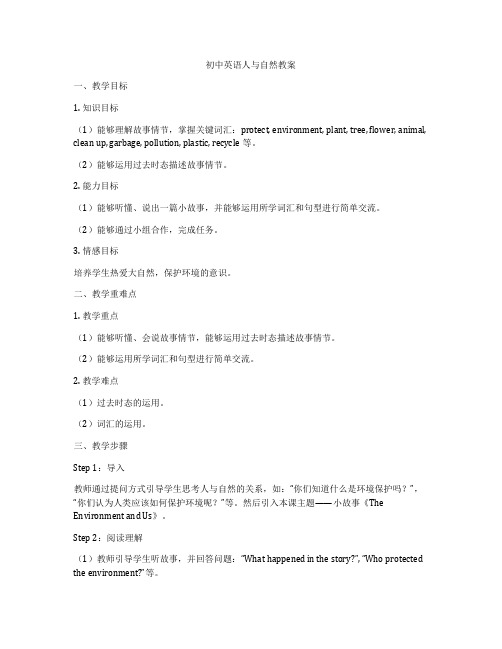
初中英语人与自然教案一、教学目标1. 知识目标(1)能够理解故事情节,掌握关键词汇:protect, environment, plant, tree, flower, animal, clean up, garbage, pollution, plastic, recycle等。
(2)能够运用过去时态描述故事情节。
2. 能力目标(1)能够听懂、说出一篇小故事,并能够运用所学词汇和句型进行简单交流。
(2)能够通过小组合作,完成任务。
3. 情感目标培养学生热爱大自然,保护环境的意识。
二、教学重难点1. 教学重点(1)能够听懂、会说故事情节,能够运用过去时态描述故事情节。
(2)能够运用所学词汇和句型进行简单交流。
2. 教学难点(1)过去时态的运用。
(2)词汇的运用。
三、教学步骤Step 1:导入教师通过提问方式引导学生思考人与自然的关系,如:“你们知道什么是环境保护吗?”,“你们认为人类应该如何保护环境呢?”等。
然后引入本课主题——小故事《The Environment and Us》。
Step 2:阅读理解(1)教师引导学生听故事,并回答问题:“What happened in the story?”, “Who protected the environment?”等。
(2)学生自主阅读故事,理解故事内容,并回答问题:“What did the people do to protect the environment?”,“What happened after they protected the environment?”等。
Step 3:词汇学习教师引导学生学习故事中出现的关键词汇,如:protect, environment, plant, tree, flower, animal, clean up, garbage, pollution, plastic, recycle等。
并通过例句、游戏等方式让学生掌握这些词汇。
英语新课标三大主题语境
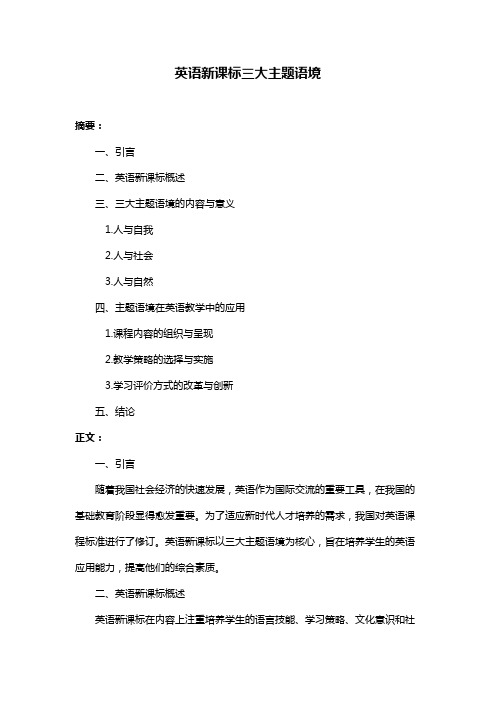
英语新课标三大主题语境摘要:一、引言二、英语新课标概述三、三大主题语境的内容与意义1.人与自我2.人与社会3.人与自然四、主题语境在英语教学中的应用1.课程内容的组织与呈现2.教学策略的选择与实施3.学习评价方式的改革与创新五、结论正文:一、引言随着我国社会经济的快速发展,英语作为国际交流的重要工具,在我国的基础教育阶段显得愈发重要。
为了适应新时代人才培养的需求,我国对英语课程标准进行了修订。
英语新课标以三大主题语境为核心,旨在培养学生的英语应用能力,提高他们的综合素质。
二、英语新课标概述英语新课标在内容上注重培养学生的语言技能、学习策略、文化意识和社会责任感。
它以三大主题语境为纲,使学生在学习英语的过程中,既能掌握语言知识,又能了解不同文化背景,形成跨文化交际的能力。
三、三大主题语境的内容与意义1.人与自我人与自我主题语境关注个体在学习、生活、情感等方面的需求与发展。
通过学习这一主题语境,学生可以培养自我认识、自我调控、自我表达等能力,从而更好地了解自己,实现个人成长。
2.人与社会人与社会主题语境强调个体与社会的关系,涉及社交、职场、家庭、教育、文化等多元领域。
通过学习这一主题语境,学生可以提高与人沟通、合作、解决问题等社会交往能力,更好地融入社会。
3.人与自然人与自然主题语境关注人类与自然环境的关系,包括环境保护、资源利用、科技发展等方面。
通过学习这一主题语境,学生可以增强环保意识,培养科学精神,形成可持续发展观。
四、主题语境在英语教学中的应用1.课程内容的组织与呈现在英语教学中,教师应根据学生的认知特点和需求,以主题语境为主线,整合语言知识、技能、策略和文化等方面的内容,形成具有内在联系的教学单元。
2.教学策略的选择与实施教师应根据主题语境,采用任务型教学、情境教学、探究式教学等多元化教学策略,激发学生的学习兴趣,培养他们的自主学习能力。
3.学习评价方式的改革与创新英语学习评价应注重过程性、多元性和发展性。
